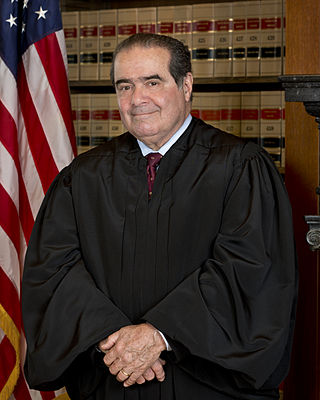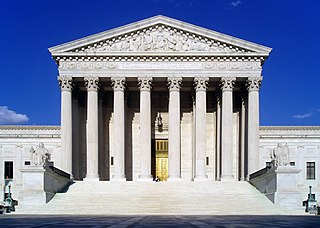
Antonin Gregory Scalia was an American jurist who served as an associate justice of the Supreme Court of the United States from 1986 until his death in 2016. He was described as the intellectual anchor for the originalist and textualist position in the U.S. Supreme Court's conservative wing. For catalyzing an originalist and textualist movement in American law, he has been described as one of the most influential jurists of the twentieth century, and one of the most important justices in the history of the Supreme Court. Scalia was posthumously awarded the Presidential Medal of Freedom in 2018, and the Antonin Scalia Law School at George Mason University was named in his honor.

Elena Kagan is an American lawyer who serves as an associate justice of the Supreme Court of the United States. She was appointed in 2010 by President Barack Obama and is the fourth woman to serve on the Court.

The Roberts Court is the time since 2005 during which the Supreme Court of the United States has been led by John Roberts as Chief Justice. Roberts succeeded William Rehnquist as Chief Justice after Rehnquist's death.
Rapanos v. United States, 547 U.S. 715 (2006), was a United States Supreme Court case challenging federal jurisdiction to regulate isolated wetlands under the Clean Water Act. It was the first major environmental case heard by the newly appointed Chief Justice, John Roberts, and Associate Justice Samuel Alito. The Supreme Court heard the case on February 21, 2006, and issued a decision on June 19, 2006.

President Barack Obama made two successful appointments to the Supreme Court of the United States. The first was Judge Sonia Sotomayor to fill the vacancy created by the retirement of Justice David H. Souter. Sotomayor was confirmed by the United States Senate on August 6, 2009, by a vote of 68–31. The second appointment was that of Solicitor General Elena Kagan to replace the retired John Paul Stevens. Kagan was confirmed by the Senate on August 5, 2010, by a vote of 63–37.

The Supreme Court of the United States handed down ten per curiam opinions during its 2010 term, which began October 4, 2010 and concluded October 1, 2011.
Fisher v. University of Texas, 570 U.S. 297 (2013), also known as Fisher I, is a United States Supreme Court case concerning the affirmative action admissions policy of the University of Texas at Austin. The Supreme Court voided the lower appellate court's ruling in favor of the university and remanded the case, holding that the lower court had not applied the standard of strict scrutiny, articulated in Grutter v. Bollinger (2003) and Regents of the University of California v. Bakke (1978), to its admissions program. The Court's ruling in Fisher took Grutter and Bakke as given and did not directly revisit the constitutionality of using race as a factor in college admissions.

The Supreme Court of the United States handed down six per curiam opinions during its 2012 term, which began October 1, 2012 and concluded October 6, 2013.

The Supreme Court of the United States handed down eight per curiam opinions during its 2013 term, which began October 7, 2013 and concluded October 5, 2014.
Michigan v. Environmental Protection Agency, 576 U.S. 743 (2015), is a landmark United States Supreme Court case in which the Court analyzed whether the Environmental Protection Agency must consider costs when deciding to regulate, rather than later in the process of issuing the regulation.
FERC v. Electric Power Supply Ass'n, 577 U.S. 260 (2016), was a case in which the Supreme Court of the United States held that the Federal Energy Regulatory Commission had the authority to regulate demand response transactions. Justice Scalia's dissenting opinion in this case was the last opinion he wrote before his death in February 2016.
Reyes Mata v. Lynch, 576 U.S. 143 (2015), is a United States Supreme Court case in which the Court ruled that the federal courts of appeals have jurisdiction to review the orders of the Board of Immigration Appeals to reject motions to reopen.
Sessions v. Dimaya, 584 U.S. 148 (2018), was a United States Supreme Court case in which the Court held that 18 U.S.C. § 16(b), a statute defining certain "aggravated felonies" for immigration purposes, is unconstitutionally vague. The Immigration and Nationality Act (INA) classifies some categories of crimes as "aggravated felonies", and immigrants convicted of those crimes, including those legally present in the United States, are almost certain to be deported. Those categories include "crimes of violence", which are defined by the "elements clause" and the "residual clause". The Court struck down the "residual clause", which classified every felony that, "by its nature, involves a substantial risk" of "physical force against the person or property" as an aggravated felony.





